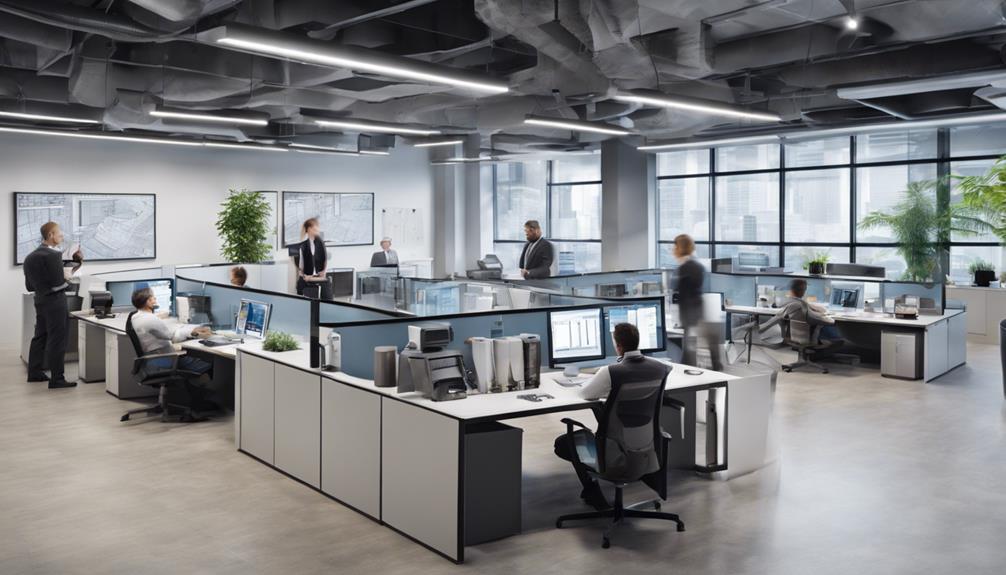When you're considering the right security system for your business, it's important to assess your unique security risks and budget. You might find that a one-size-fits-all approach won't cut it, especially when it comes to customizing features like access control and surveillance. Understanding how these systems can adapt to your specific needs is vital, but there are several factors to weigh before making a decision. What if the right choice could not only safeguard your assets but also evolve with your business? Let's explore how you can make this significant decision.
Key Takeaways
- Conduct a thorough risk assessment to identify specific vulnerabilities and prioritize security needs unique to your business.
- Set a realistic budget that accounts for both initial setup and ongoing maintenance of the security system.
- Explore various types of security systems, such as access control and surveillance, to find the best fit for your business requirements.
- Assess customization capabilities of the system to ensure it aligns with your industry-specific security needs and can adapt as your business grows.
- Read reviews and consult with security professionals to gain insights into system performance and tailored solutions for your unique security challenges.
Assess Your Business Security Risks
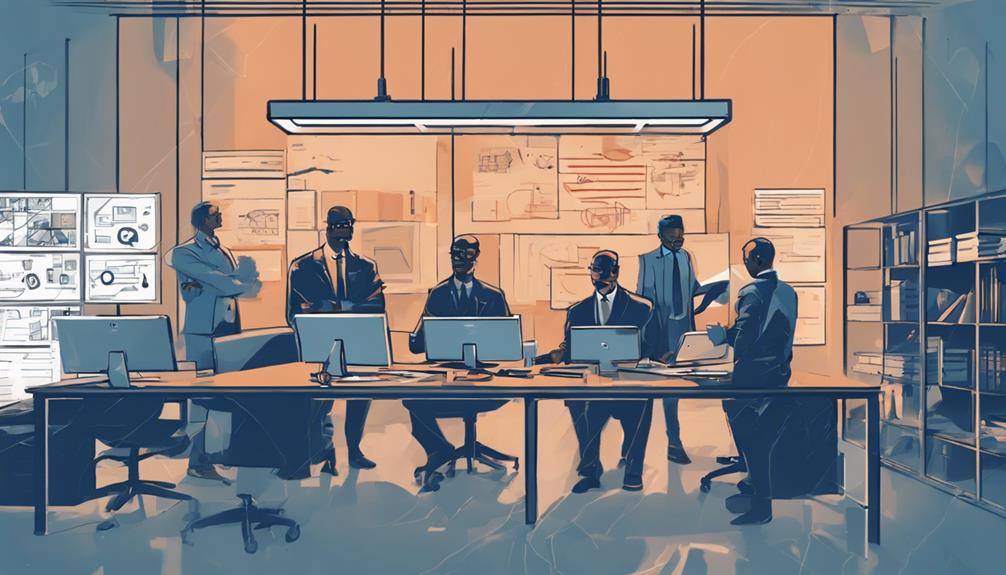
Evaluating your business security risks is a crucial step in safeguarding your assets and operations. Conducting a thorough risk assessment allows you to identify potential security vulnerabilities that could jeopardize your enterprise. Begin by analyzing both physical and digital aspects of your business, including access points, employee protocols, and data protection measures. Pay particular attention to high-risk areas that may attract threats, such as cash handling or sensitive information storage. Involve your team in this process; their insights can reveal overlooked weaknesses. By prioritizing these vulnerabilities, you can implement targeted strategies, ensuring your security system is robust and effective. Ultimately, a detailed understanding of your risks empowers you to make informed decisions regarding your security infrastructure.
Determine Your Budget
Setting a realistic budget is essential for developing an effective security system that meets your business needs. Begin by evaluating your budget constraints, ensuring that you allocate sufficient resources without compromising your financial health. Conduct a thorough cost comparison between various security systems and their features, identifying those that align with your specific requirements. Consider both initial setup costs and ongoing maintenance expenses to gain a true understanding of the financial commitment. Don't overlook potential long-term savings from investing in a high-quality system that can deter threats and reduce loss. Ultimately, a well-defined budget empowers you to make informed decisions, ensuring you select a security solution that delivers value and security for your business. When considering budget allocation, it's important to keep in mind the scalability and customization options that may be necessary for multi-site businesses Streamlining Security Systems for Multi-Site Businesses.
Explore Different Security System Types
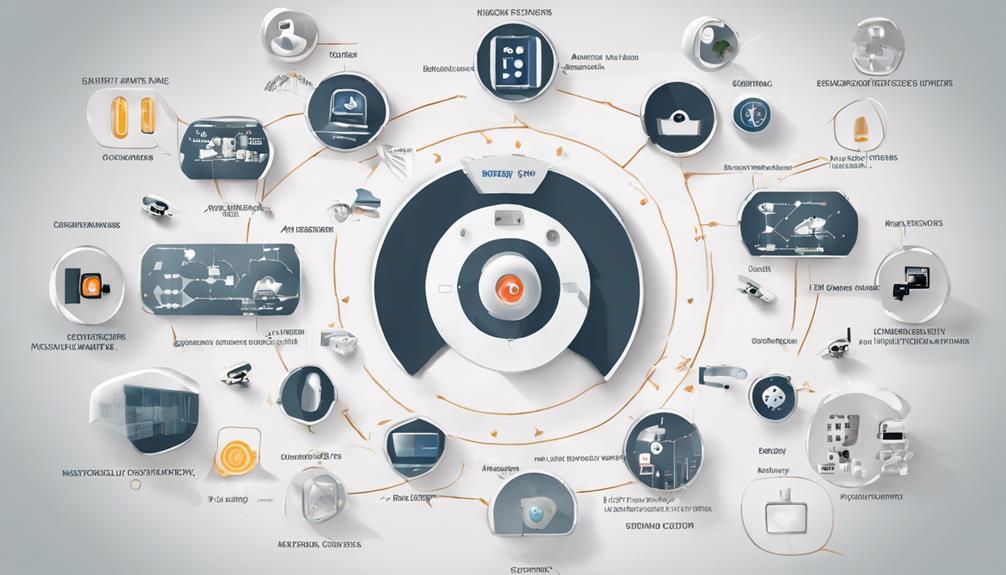
When it comes to securing your business, understanding the various types of security systems available is essential. Selecting the right system can enhance your operational integrity and protect your assets. Here are three key types to evaluate:
- Access Control Systems: These limit entry to authorized personnel, ensuring that sensitive areas remain secure.
- Surveillance Technology: Employing cameras and monitoring systems allows you to keep a watchful eye on your premises, deterring potential threats.
- Alarm Systems: These provide immediate alerts in case of unauthorized access, ensuring prompt response to potential breaches.
Evaluate System Features
When selecting a security system, it's vital to assess the essential security features that align with your business needs. You'll also want to take into account the customization options available, as these can greatly enhance the system's effectiveness. By evaluating these elements, you can guarantee that the security system you choose provides thorough protection tailored specifically for your operation.
Essential Security Features
Evaluating the crucial security features of a system is critical for guaranteeing the safety of your business. You must guarantee that your security solution encompasses key functionalities to protect your assets effectively. Consider these essential features:
- Access Control: Implement strict access protocols to regulate who enters your premises, enhancing security through tailored permissions. It's important to enhance business safety by controlling access effectively.
- Surveillance Technology: Utilize advanced surveillance systems for real-time monitoring, guaranteeing you have eyes on all critical areas.
- Alarm Systems: Integrate robust alarm systems for instant alerts, enabling prompt responses to potential threats.
Incorporating remote monitoring, security audits, perimeter protection, and intrusion detection is also crucial. Providing employee training guarantees that your team knows how to react during security breaches, reinforcing your business's overall security posture.
Customization Options Available
The effectiveness of a security system often hinges on its ability to adapt to your specific business needs. Custom software solutions empower you to integrate various features that align with your operational requirements. You can choose from a range of options, such as access control systems tailored to your facility's layout and employee roles, or surveillance cameras that adjust to lighting conditions and can be accessed remotely. Personalized monitoring services guarantee that you receive real-time alerts, enabling swift responses to incidents. By leveraging these customization options, you enhance your security posture, guaranteeing that every aspect of your system is designed to protect your assets and address vulnerabilities uniquely. This tailored approach maximizes both efficiency and effectiveness in safeguarding your business. Additionally, understanding the installation cost and time required for keyless entry systems can help you make informed decisions on enhancing your business security Understanding Keyless Entry Installation for Businesses.
Consider Scalability Options
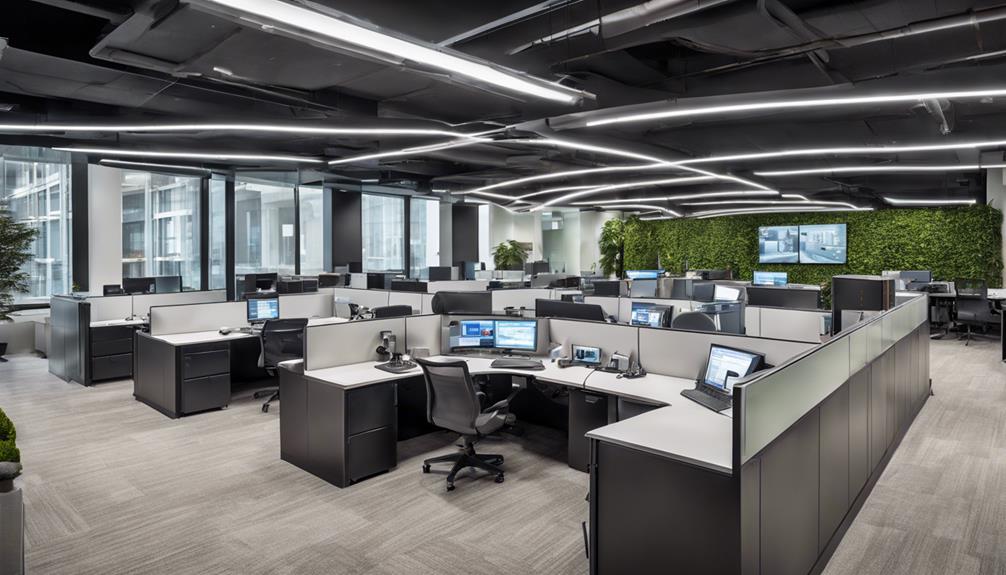
When selecting a security system, it's essential to take into account how it can accommodate your business's future growth. Look for modular system features that allow for easy upgrades and expansions as your needs evolve. This foresight will guarantee your investment remains effective and relevant over time. Additionally, understanding the benefits of a Master Key System can provide insight into how customizable security solutions can enhance access control in your business.
Future Growth Considerations
As your business evolves, considering scalability options for your security system becomes vital to maintaining robust protection. Long-term planning is indispensable, especially if you anticipate business expansion. A flexible security system can adapt to your growing needs without requiring a complete overhaul. Here are three key factors to contemplate:
- Modular Components: Confirm your security system allows for the addition of new devices or features as your business scales. Keyless entry systems, like those discussed in Unlocking Convenience: The Benefits of Keyless Entry Systems, offer a high level of convenience and security for businesses.
- Cloud-Based Solutions: Opt for cloud integration to facilitate remote management and easy updates, accommodating growth seamlessly.
- User Capacity: Verify that the system can support more users and devices without performance degradation.
Modular System Features
Investing in a modular security system can greatly enhance your business's scalability and adaptability. With a modular design, you can easily implement security upgrades as your business needs evolve. This flexibility allows you to expand your security infrastructure without incurring the costs of a complete system overhaul. You gain the power to add components—such as cameras, access controls, or alarm systems—tailored to specific areas of growth or risk. Additionally, modular systems often integrate seamlessly with existing technologies, ensuring a cohesive security environment. By choosing a modular approach, you position your business to respond dynamically to emerging threats, regulatory changes, or operational expansion, making it a strategic investment in your enterprise's long-term security posture. Implementing a modular security system also enables you to leverage advanced features like biometric systems to further enhance access control and identity verification processes.
Research Customization Capabilities
Finding the right security system for your business often hinges on its ability to be customized to meet your unique needs. Researching customization capabilities is essential for guaranteeing you receive the full customization benefits that tailored solutions offer. Consider the following factors:
- Scalability: Guarantee the system can grow with your business, adapting to increased security demands. Businesses may benefit from systems that offer scalability, allowing for future expansion without the need for a complete overhaul.
- Feature Options: Look for systems that allow you to select specific features relevant to your industry. Customizable feature options can enhance the security measures tailored to enhancing communication with business intercom systems.
- User Interface: The system should offer a customizable user interface that aligns with your operational workflow. A user-friendly interface that can be personalized to your business's processes can streamline security management effectively.
Check Integration With Existing Systems
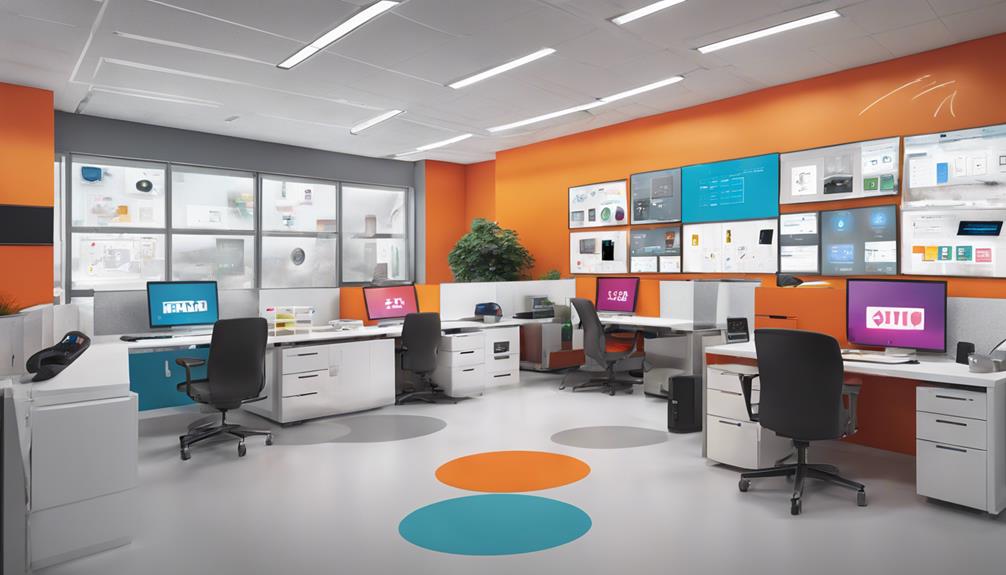
A crucial step in selecting a security system for your business involves checking its integration with existing systems. You need to confirm system compatibility to avoid integration challenges that could disrupt your operations. Assess how well the new security solution interacts with your current infrastructure, including alarm systems, access controls, and monitoring tools. A seamless integration can enhance efficiency and provide a thorough security overview.
Here's a quick reference table for evaluating integration:
| System Type | Compatibility Check | Potential Challenges |
|---|---|---|
| Alarm Systems | Verify communication protocols | Legacy system limitations |
| Access Controls | Assess integration APIs | Software incompatibility |
| Monitoring Tools | Test data sharing capabilities | Network security concerns |
Evaluate these aspects diligently to confirm a robust security framework.
Read Reviews and Testimonials
Before finalizing your security system choice, it's essential to read reviews and testimonials from other businesses that have implemented similar solutions. These insights will help you gauge customer experiences and user satisfaction, ensuring you select a system that meets your specific needs. When evaluating reviews, focus on aspects like Performance to evaluate how well the system has functioned in real-world scenarios, Support to look for feedback on the vendor's responsiveness and assistance during installation and ongoing use, and Adaptability to determine whether the system can be customized to fit unique security requirements. Additionally, consider exploring affordable nationwide commercial security audits and locksmith consultations to enhance your security strategy.
Consult With Security Professionals

Consulting with security professionals is essential for effectively evaluating your business's security risks. They can help you understand the various system options available and identify tailored solutions that meet your unique needs. By leveraging their expertise, you'll make informed decisions that enhance your overall security posture. Whether you need recommendations for access control systems or CCTV cameras, locksmiths can provide valuable insights on enhancing business security based on your specific requirements.
Assessing Security Risks
How can you effectively identify the security vulnerabilities that could jeopardize your business? Conducting a thorough risk assessment is essential for establishing your security priorities. To do this, consider the following steps:
- Evaluate Current Security Measures: Analyze the effectiveness of your existing systems and protocols.
- Identify Potential Threats: Consider both internal and external threats, including theft, vandalism, and cyber-attacks.
- Assess Vulnerability Levels: Determine which areas of your business are most susceptible to these threats.
Understanding System Options
Your business's security needs can vary considerably based on its size, location, and industry, making it essential to explore available system options with the help of security professionals. Engaging with these experts allows you to conduct informed system comparisons, ensuring you select a solution that aligns with your unique requirements. They can guide you through the latest technology advancements, showcasing systems that utilize cutting-edge features like AI-driven surveillance or integrated access control. By analyzing your specific context, security professionals can pinpoint vulnerabilities and recommend systems that offer ideal protection while maximizing efficiency. This strategic approach not only enhances your security posture but also empowers you to make decisions that safeguard your assets effectively.
Tailored Solutions Available
Security professionals offer tailored solutions that cater to the specific needs of your business, guaranteeing that the systems implemented are not just effective but also efficient. By consulting with experts, you can access personalized solutions designed to enhance your security posture. Here are three key advantages of tailored technology:
- Risk Assessment: Professionals analyze your unique vulnerabilities and recommend systems that directly address them.
- Integration: They guarantee that new security measures seamlessly integrate with your existing infrastructure, maximizing functionality.
- Scalability: Tailored solutions can grow with your business, allowing for adjustments as your security needs evolve.
Low Rate Locksmith Services
Finding the right locksmith services for your business can greatly impact your overall security strategy. You need affordable locksmiths who understand your unique requirements and offer tailored solutions. Opting for low-rate locksmith services doesn't mean compromising quality; it allows you to allocate resources effectively while guaranteeing robust security measures. Evaluate their emergency services, as swift response times can be vital in critical situations. Look for locksmiths who are licensed and insured, showcasing their commitment to professionalism and reliability. Confirm they provide a thorough range of services, from lock installations to advanced security systems. By evaluating these factors, you can align your choice of locksmith with your security goals, empowering your business to thrive in a secure environment.

